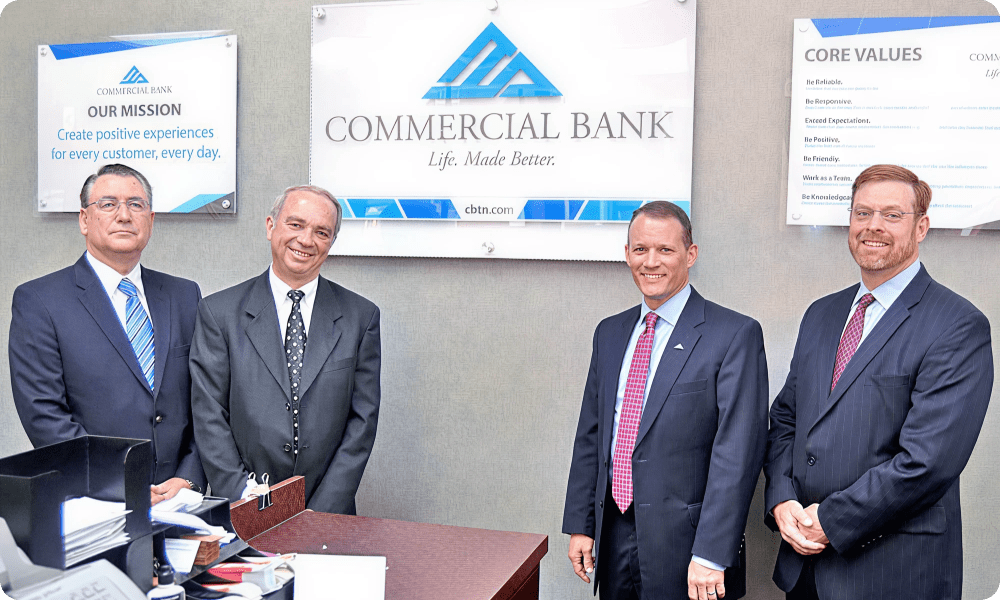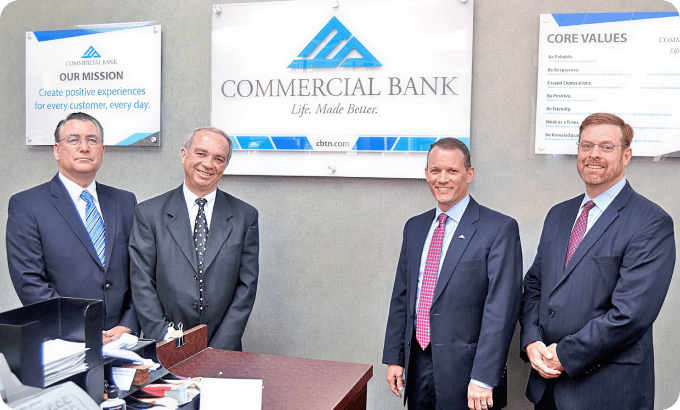Marketplace Regolith
Your investment opportunities
Commercial Bancgroup
U.S. bank holding company
Updated on 15 Dec 2025

Terry L. Lee
CEO
“We are building a bank where trust and long-term relationships matter most. Our goal is to be a reliable partner for the clients we serve.”

Updated on 15 Dec 2025
Why Commercial Bancgroup Is a Must-Have in Your Portfolio
Commercial Bancgroup is a regional bank from Tennessee with a resilient business model. The company operates a network of 34 branches and one office in North Carolina, providing a full range of banking services to both individual and corporate clients. Its financial base includes $2.3 billion in assets, $1.8 billion in loans, and $1.9 billion in deposits, while a Tier 1 capital ratio of ~13.6% underlines its strong capital position.
Ecosystem and business model — the bank generates income from lending, deposits, and business services, showing steady growth with a well-managed risk profile. The purpose of the IPO is to reduce debt and strengthen the balance sheet, creating opportunities for further regional expansion.
Against the backdrop of the limited number of bank IPOs in the U.S., Commercial Bancgroup’s market debut stands out as an attractive case, combining traditional banking with a focus on stability and regional development.
Exclusive Participation Terms
The company is going public on the Nasdaq Capital Market with an offering of 3.74 million shares (934 thousand primary) at a valuation of around $366 million, making the IPO of Commercial Bancgroup a key event of 2025 for the regional financial institutions sector.
Application and funding deadline — today, September 30, 18:00 (Dubai time).
Key Facts Investors Should Know
• Business scale: a regional bank from Tennessee with 34 branches and one office in North Carolina.
• Financial base: $2.3B in assets, $1.8B in loans, and $1.9B in deposits.
• Capital strength: Tier 1 capital ratio of ~13.6% (core capital, reflecting the bank’s buffer and resilience).
• Deal highlight: a rare bank IPO in the U.S., with proceeds aimed at debt repayment and balance sheet strengthening.
• Market driver: regional banks play a key role in financing small and medium-sized businesses, with stable demand for their services.
The Founding and Growth of Commercial Bancgroup
Commercial Bancgroup was founded in 1976 by banker E. Oscar Robertson in Harrogate, Tennessee, where its headquarters remain today. Starting with a small branch in Appalachia, the bank gradually expanded under his leadership: the first additional branch opened in 1979, and by 2025 the network had grown to 35 offices across Tennessee, Kentucky, and North Carolina. Over the decades, Commercial Bank has built a reputation as a reliable partner focused on long-term relationships with customers and local communities.
The company’s financial base includes $2.3 billion in assets, $1.8 billion in loans, and $1.9 billion in deposits, with total capital of $235 million. Its Tier 1 capital ratio of ~13.6% (core capital reflecting the bank’s resilience) significantly exceeds regulatory minimums and underscores its stability.


Commercial Bancgroup maintains a focus on traditional regional banking — lending to small and medium-sized businesses, mortgages, deposits, and retail services. The IPO aims to reduce debt and strengthen the balance sheet, providing a foundation for further growth and potential M&A opportunities.
The company plans to offer 3.74 million shares (934 thousand primary) at a valuation of around $366 million, making the IPO of Commercial Bancgroup one of the notable banking events of fall 2025 in the U.S. For investors, this is an opportunity to invest in a regional bank with nearly 50 years of heritage, a resilient model, and tangible assets.
Frequently Asked Questions (FAQ)
— What is an IPO?
An IPO (Initial Public Offering) is when a private company lists its shares on a stock exchange for the first time to raise capital from investors. From that point onward, the company’s shares can be freely bought and sold on the open market.
— Where are IPOs conducted?
IPOs take place on the world’s largest stock exchanges. In the U.S., the primary venues are the NYSE (New York Stock Exchange) and NASDAQ. Once a company goes public, its shares are freely traded on these exchanges, and the market price is established after the offering.
— What is allocation?
Allocation (from “allocation” — distribution) refers to the process of distributing resources, assets, or capital for maximum efficiency. In investing, allocation usually means distributing the available amount of shares among investors in an IPO or private placement.
— How much allocation does an investor receive?
The allocation size depends on the specific deal and typically ranges from 2% to 30% of the submitted order. In rare cases, allocation may reach up to 100%. Information about the actual IPO volume and share price we entered at becomes available roughly one day before the offering, approximately six hours prior to the trade.
Example — Bullish IPO (Aug 13, 2025):
An investor placed an order for $10,000. The allocation was 29.6%, meaning $2,960 was invested in the IPO. The remaining $7,040, including the purchase commission, was refunded to the balance and became available for withdrawal.Klarna IPO (Sept 10, 2025):
An investor placed an order for $10,000. The allocation was 14%, meaning $1,400 was invested in the IPO. The remaining $8,600, including the purchase commission, was refunded to the balance and became available for withdrawal.Figure IPO (Sept 11, 2025):
An investor placed an order for $10,000. The allocation was 16%, meaning $1,600 was invested in the IPO. The remaining $8,400, including the purchase commission, was refunded to the balance and became available for withdrawal.Gemini IPO (Sept 12, 2025):
An investor placed an order for $10,000. The allocation was 29%, meaning $2,900 was invested in the IPO. The remaining $7,100, including the purchase commission, was refunded to the balance and became available for withdrawal.Legence IPO (Sept 12, 2025):
An investor placed an order for $10,000. The allocation was 78%, meaning $7,800 was invested in the IPO. The remaining $2,200, including the purchase commission, was refunded to the balance and became available for withdrawal.Black Rock Coffee Bar IPO (Sept 12, 2025):
An investor placed an order for $10,000. The allocation was 68%, meaning $6,800 was invested in the IPO. The remaining $3,200, including the purchase commission, was refunded to the balance and became available for withdrawal.
— Why do companies go public?
To raise growth capital, increase brand visibility, and provide early investors and employees with an opportunity to sell part of their shares.
— How is participating in an IPO different from buying shares on the exchange?
When you participate in an IPO, you buy shares before they start trading publicly. This provides an opportunity to purchase at the fixed offering price but also carries the risk that the price may drop once trading begins.
— What do I get by participating in an IPO through Regolith?
You become an investor in the company at the IPO stage via our U.S. partner infrastructure. After the transaction is completed and the lock-up period expires, profits from the share sale are distributed among investors proportionally to their stake in the deal.
— What is a lock-up period and how long does it last?
A lock-up period is a timeframe set by the issuer and underwriters during which shares cannot be sold. For IPOs offered through our platform, this period is 93 days. Once it ends, the shares are sold on the exchange and proceeds are distributed among investors.
— How is participating through the platform different from buying shares independently?
To buy independently, you would need access to a U.S. broker, a significant investment amount, and approval from underwriters. The platform pools capital from investors, providing access to IPOs that are otherwise unavailable to most individuals.
— Through whom is IPO participation carried out?
We operate through a U.S.-based structure that works with a licensed broker in the U.S. Our partner selects promising IPOs and participates in the offering under its own name.
— How is the deal structured legally?
An investor signs an agreement/offer to participate in the investment product. Regolith then transfers funds to its partner entity — Wealthy Labs Limited (the provider), which enters into a forward contract with the broker and executes all operational activities. The provider delivers the financial outcome to Regolith, which then distributes proceeds among investors.
— Is there a minimum investment amount?
Yes. Each IPO has a defined minimum entry threshold, shown on the offering page. On average, Regolith provides access starting from $500.
— Do I receive shares into my personal brokerage account?
No. Shares are purchased and held in the partner’s brokerage account. After the lock-up period, the broker sells the shares and transfers proceeds for distribution among investors.
— Can shares be transferred directly to my brokerage account?
No. Participation is structured via a forward contract with the partner’s brokerage infrastructure. The deal is executed on behalf of the partner, and settlements with investors are carried out through the platform.
— How can I sell my shares after the IPO?
Sales are processed automatically: once the lock-up expires, the partner broker sells the shares on the exchange, and proceeds are distributed proportionally among investors.
— What are the risks of investing in IPOs?
IPOs are high-risk investments. While they may offer high returns, they also carry significant volatility. Share prices on the first trading day — and after the lock-up — can fluctuate sharply. There is a risk that the market price will fall below the offering price. In addition, macroeconomic and sector-specific factors can affect outcomes.
— Can I know in advance how much I will earn?
IPO returns are not guaranteed. The final result depends on the share price at the time of sale after the lock-up, overall market conditions, and the company’s performance.
— How can I verify that Regolith participates in IPOs?
We publish all available deal information in the client dashboard. Additionally, we provide an agreement disclosing the infrastructure used for transactions. Broker and partner documents are not shared, as they contain confidential data protected by contractual obligations.

Terry L. Lee
CEO
“We are building a bank where trust and long-term relationships matter most. Our goal is to be a reliable partner for the clients we serve.”
Details
Ticker
CBKExchange
Nasdaq Capital MarketIPO Price Range
$25.75–27.75IPO Valuation
$366MShares Offered
3.74M (934K primary)Underwriters
Hovde GroupIPO Date
1 Oct 2025Submit by
30 Sep 2025, 6:00 PM (UAE)Terms
Deal Fee
5%Carried Interest
30%Risk potentinal
Very HighLock-up period
93 daysCommercial Bancgroup
U.S. bank holding company
Updated on 15 Dec 2025

Terry L. Lee
CEO
“We are building a bank where trust and long-term relationships matter most. Our goal is to be a reliable partner for the clients we serve.”

 Русский
Русский 




















